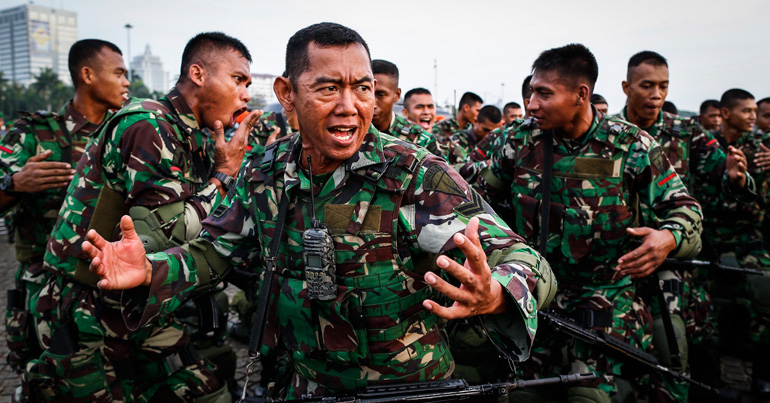General Gatot Nurmantyo’s short-lived suspension of military operations with Australia may have been part of a power play against President Joko Widodo

Indonesia’s reversal of its abrupt and short-lived suspension of military operations with Australia – suspected to be an attempt by the army chief General Gatot Nurmantyo to increase his influence in domestic politics – has revealed a stark disconnect between the ambitions of the armed forces and the authority of the central government.
According to Tom Power, an Indonesian political researcher at the Australian National University, Nurmantyo’s seemingly unilateral action was just the latest example of the Indonesian National Armed Forces (TNI) flexing its muscle for the Indonesian public.
“This posturing has been for the benefit of domestic audiences,” he said, speaking before the backdown over the suspension was announced this afternoon. “Nurmantyo is widely seen as having designs on the presidency, and his tenure has been characterised by promoting the military as an essential bastion against a variety of threats to national security and social stability. His relationship with Jokowi [President Joko Widodo] is also believed to be strained.”
The initial suspension was announced yesterday following a complaint lodged in November by an Indonesian Special Forces commander who took offence to educational materials found at an Australian Special Forces base in Perth. The complaint claimed the materials, apparently part of the training programme’s curriculum, promoted independence for the Indonesian province of West Papua and disrespected Indonesia’s founding values, or Pancasila.
The Australian Broadcasting Corporation reported that on 23 and 24 November 2016, Australian Defence Force (ADF) Air Chief Marshal Mark Binsin personally wrote to General Nurmantyo to explain that the materials did not reflect the official stance of the ADF.
But Binsin’s reassurances seemingly failed to placate the TNI chief, who sent a cable on 29 December 2016 demanding all military cooperation with the ADF cease immediately.
The announcement took both Jakarta and Canberra by surprise, and Indonesia’s defence minister Ryamizard Ryacudu has since claimed that the decision amounted to an act of low-ranking subordination and “was all the doings of some lieutenants”.
Historically, the relationship between the two countries has been poor. Australia was instrumental in securing Timor-Leste’s independence from Indonesia in 2002 and, as a result, the TNI is particularly sensitive to the idea of Australian interference in West Papua.
The 2002 bombing of two nightclubs in Bali, which killed 202 people including 88 Australians, served as a catalyst for the renewal of joint military operations between the two countries.
Bilateral security relations were further strengthened by the signing of the Lombok Treaty in 2006, which committed both countries to cooperation on a broad range of security issues ranging from defence to counterterrorism and intelligence-sharing.
But the relationship was dealt a significant blow in 2013 when information leaked by Edward Snowden revealed that Australian spy agencies had attempted to listen in on the personal phone calls of then-president Susilo Bambang Yudhoyono and his wife. The revelations provoked Indonesia to put a stop to military operations.
Attempts to rebuild the relationship suffered a further setback in 2015 when two Australian citizens convicted of smuggling heroin were executed following drawn-out diplomatic negotiations and a decade-long legal campaign to pardon the duo.
Howard Dick, a professor at the University of Melbourne who has carried out extensive research on Indonesian politics, said that relations had definitely improved since 2013, with “both foreign ministers working well together and good progress being made on the business front”.
While both governments have said that the temporary suspension will not have any lasting impact on the bilateral relationship, Dick said that this would depend on the reasons behind the move.
“At first sight, it looks like a huge overreaction,” he said. “But there are more questions than answers for now. Were the Indonesians frustrated at the lack of response [to the original complaint]? Does it connect with the Ahok trial? Is the message being sent to the domestic constituency or to Australia? Is there a China factor? Whether it has longer term implications depends on what is behind it.”
Indonesia’s retreat on Australia row reveals rift with armed forces
General Gatot Nurmantyo's short-lived suspension of military operations with Australia may have been part of a power play against President Joko Widodo

